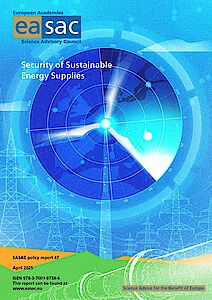EASAC Energy Programme
The Energy Programme provides independent and leading edge scientific assessments and advice to EU energy and climate policy makers.

Topics are selected by EASAC Council on the basis of advice from the EASAC Energy Steering Panel and can encompass a wide range of energy issues of priority interest to the EU, including energy resources, energy systems integration, renewable energies, energy efficiency, GHG emissions, electricity grid management, and key aspects of energy security and sustainability.
The EASAC Energy Steering Panel is nominated by the national science academies. It advises on the focus of the energy programme and makes inputs to energy debates internationally. It also helps to communicate the findings of EASAC working groups to policy makers at EU and National levels. The Energy Steering Panel meets twice per year and is co-chaired by Professor Neven Duić and Professor Paula Kivimaa.
The Energy Programme has produced over 30 reports and statements since 2004, some of them jointly with the EASAC Environment Programme.
Work is currently on-going to support the dissemination of EASAC’s most recent report, Security of Sustainable Energy Supplies, launched on 8th April 2025. It examines how Europe’s shift to low-carbon energy offers opportunities to strengthen resilience while also reducing emerging vulnerabilities. It identifies the most pressing threats to the EU’s energy system and presents 12 key policy recommendations to help mitigate them.
Dissemination of earlier publications also continues. These include:
- Future of Gas - May 2023
- Decarbonisation of Buildings - June 2021
- Hydrogen and Synthetic Fuels – September 2020
- Decarbonisation of Transport - April 2019
- Electricity storage - June 2017
- Multifunctionality and Sustainability in the EU’s Forests – May 2017 (jointly with the EASAC Environment Programme)
Looking ahead, the EASAC Energy Steering Panel will continue to monitor EU energy and climate policy developments, alongside progress in relevant scientific research. EASAC will pay particular attention to the Clean Industrial Deal, the new Affordable Energy Action Plan, and expected revisions to the energy security framework, providing independent, science-based advice to policymakers as they finalise and implement new measures. The EASAC Energy Programme will also continue collaborating with the EASAC Environment Programme on policy advice relating to the climate impacts of energy, including the use of biomass for energy.































